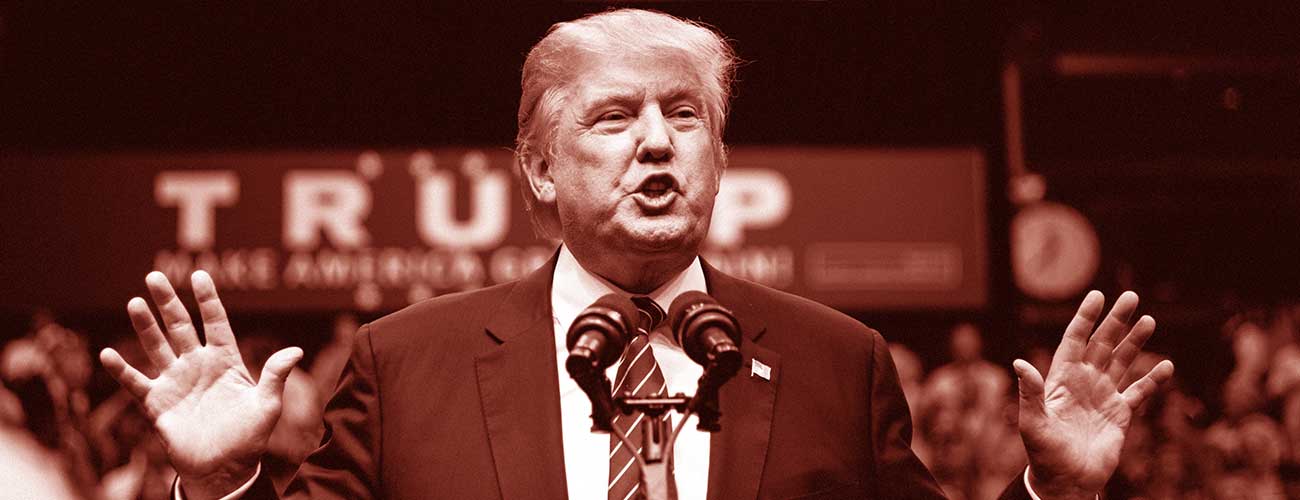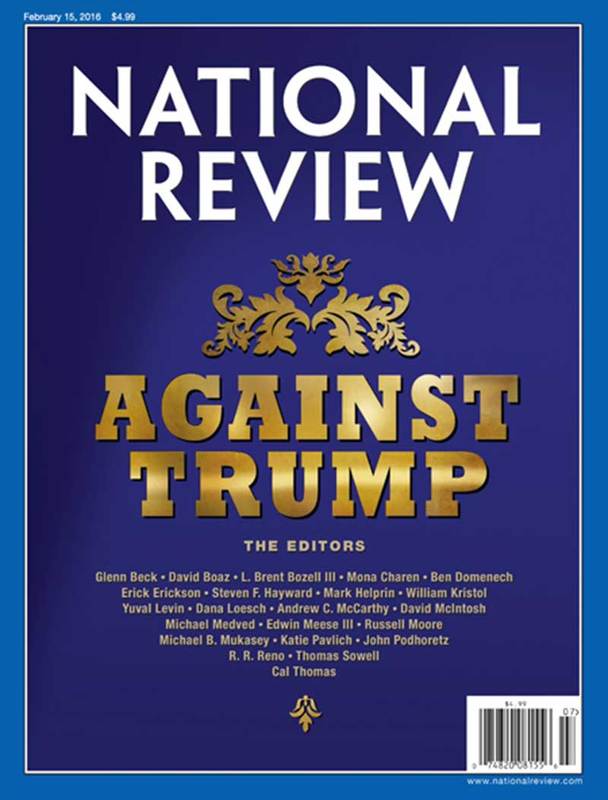Sign up for the daily CJR newsletter.
The website of conservative news and opinion magazine National Review has an entire section titled simply: “Against Trump.” The words also headlined a February print edition. A recent cover depicts Trump as a “clown prince,” comfortably seated in a throne while competitor-turned-ally Chris Christie kneels before him.
Trump’s anti-media rhetoric often targets the so-called liberal press, but he has also sparred with reporters from prominent conservative outlets like Fox News and Breitbart. The progressive magazine Mother Jones has been turned away from campaign events, but the Trump campaign has also rejected National Review’s requests for permission to cover him.
“If he’s the nominee, it’s not going to be ideal,” National Review reporter Alexis Levinson told Mother Jones. “If the Democratic nominee is willing to credential National Review and the Republican nominee is not, think on that one for a second. That’s a strange dynamic.”
Rich Lowry, National Review’s editor since 1997, calls the Trump campaign’s exclusion of his reporters “just a purely vindictive policy to try to lock out people they don’t like.” Lowry, who also writes for Politico and Time and appears frequently on Meet the Press and The McLaughlin Group, talked to CJR about how the magazine and other conservative media have confronted the challenge of covering Trump. This conversation has been edited for length and clarity.
How does the National Review see Trump?
We consider him a crude populist, which National Review has opposed going back decades. It’s a very powerful, longstanding tradition in American life and politics that he represents. He’s basically a Jacksonian populist. We’ve seen pretty potent iterations of that in recent decades, running from George Wallace to Ross Perot to Pat Buchanan, and we’ve opposed them every single time, going back to the ’60s with Wallace.
He’s just not our type of candidate. In our commentary we’ve been highly critical, but we have many types of journalism in our arsenal. The pure opinion pieces have been quite brutal. It’s our job to try to analyze and make sense of what’s going on in politics, so we’ve written pieces that are more purely analytical to go along with those fierce political denunciations and in our reporting, within our broad worldview, we try to play it straight. Our reporters are going to tell the truth and tell us what’s happening.
What’s the difference between the George Wallace coverage and Trump coverage today?
I’ve been reading up on Wallace. One thing, it was prior to the age of cable TV. Wallace rallies were quite raucous; there were fights or protestors, so it might’ve been that they would have gotten wall-to-wall coverage in the current environment. I get the impression that a lot of the Wallace coverage was dismissive initially and then people took him more seriously as he showed that he had a real following.
There are aspects of this kind of populism that we agree with or understand the appeal of, but it’s not conservatism. There’s some overlap with the American conservative properly understood, but it’s not the whole thing, and that’s what Trump and his supporters want to make it, really. They want to jettison the ideology of limiting government and constitutionalism and liberty and American exceptionalism, and substitute this nationalistic populism instead.
Is it best for the media to lambast Trump? Or should they ignore him?
I think the media obviously has given him a lot of oxygen and is partly responsible for the whole phenomenon just because he rates well, so everyone’s desperate to have him on for interviews, and it’s just easy ratings to throw up his rallies or his news conference and play them from beginning to end. So the media has been partly complicit in what’s happened. I don’t think it’s the job of the mainstream media to attack or critique or dismiss the guy. But it shouldn’t be their role to give him 10 times the coverage of anyone else, which tilts the whole playing field his way no matter what they’re saying about him.
Why do you think he does receive this amount of coverage?
Just one word: ratings.
National Review recently endorsed Ted Cruz. Can you take me through how you came to that decision?
He’s pretty much a down-the-line conservative, with some exceptions. He had a libertarian tweak on foreign policy and national security for a little while, which wasn’t exactly where we are. He opposes the Trans-Pacific Partnership, which we tend to be supportive of. But beyond that, we line up with him on issues almost exactly. He’s a very impressive guy; he’s really smart, well-informed, highly disciplined. You never have to worry that you’re going to be embarrassed by him not knowing something that comes up in an interview, or at a debate, or worry about him handling himself in a professional way. Lastly, there’s the practical consideration that among the conservatives left in the field, he’s the guy who has the best shot of actually getting nominated.
So are people in the mood for a populist?
Trump has candidate skills and media skills that few other politicians have had in American life, perhaps ever. I’m not sure there’s been a candidate in a primary who has ever so dominated media coverage, almost minute by minute. Barack Obama got a lot of favorable coverage and a lot of attention, but nothing like this. It just goes to show if you rate, people are going to have you on. All of that can be much more meaningful than all the paid advertising that anyone can come up with. You put it all together–it’s not an overwhelming, inevitable march towards nomination because he’s still not getting 50 percent and there’s almost 50 percent of the party opposed to or at least not enthused about him–but you have a significant plurality who’s really bonded to the guy, and maybe the field is fractured in just the right way to make it possible for him to get over the top.
Do you think he criticizes the media, but then utilizes it as a tool, his way of throwing his weight around?
He long ago realized, going back decades, in his career as a businessman, which wasn’t just a career as a businessman as much as it was a career as a marketer and a showman out raising sales, that if he has an opinion and if it’s a strong opinion and a controversial one, people are going to write about you and they’re going to have your name in the headlines. Whether most people agree with you or not, that publicity itself is literally priceless.
Has America ever needed a media defender more than now? Help us by joining CJR today.








